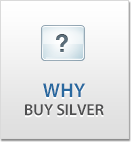PayPal manages online money transfers from all over the world, and is a great way to pay for many items and services online. But is it a good choice of payment method for those who want to purchase silver rand other precious metals online? This guide to using PayPal to buy silver will look at all the different aspects of using this form of payment in order to help you decide if it is the right one for you.
Not Accepted Everywhere
As PayPal has been increasing in popularity over the years, more and more precious metal dealers are accepting this form of payment from those wishing to make a purchase from them. However, this method of payment has not reached the penetration levels of other forms of payment such as credit cards and bank wires. That being said, two dealers who you can buy silver bullion from online are JM Bullion and Silver.com, both of which sell a wide variety of coins and bars.
Can Be Costly
While some forms of payment, such as bank wire transfers, can cost money to setup and send, others such as checks can be free. PayPal, however, almost always seems to incur a fee from online dealers, which is then added to the total amount for the purchase. While this can vary from dealer to dealer, it can be around 3%. While this doesn’t sound like much, when you take into consideration the sometimes large sums of money involved in silver transactions, it can soon mount up.
Relatively Short Clearing Time
PayPal transactions tend to have a shorter clearing time than most other forms of payment. With these payments taking around two days to clear, they can be quicker than checks and direct deposits.
This is worth remembering when selecting a payment method as a short processing time allows you to lock in the price of the silver before it has a chance to rise, while waiting for the transaction to be completed. A wait time of just a week could see the price rise enough to significantly reduce the amount of silver that eventually reaches you.
Risk of Disputes and Chargebacks are High
One reason why many sellers don’t always accept PayPal payments, and why you shouldn’t always either, is that the chance of a payment being contested is high. Once a payment has been made, and the goods despatched, the person who sent the payment is able to file a dispute with PayPal.
In most cases, PayPal will side with the buyer, and refund the money sent. This allows the buyer to then walk away with the ordered items as well as the money. As PayPal is required to keep chargebacks under a certain amount, they will refund the money to the complainant rather than risk a chargeback occurring.
Even when buying silver using PayPal, similar incidents can occur. The money that is sent can be withdrawn by the seller who could then refuse to fulfil the order. While this is illegal, PayPal has no means of refunding the money if there is none left in the sellers account. While this isn’t the norm, it can, and does happen so do not take for granted that all PayPal transactions are guaranteed.





